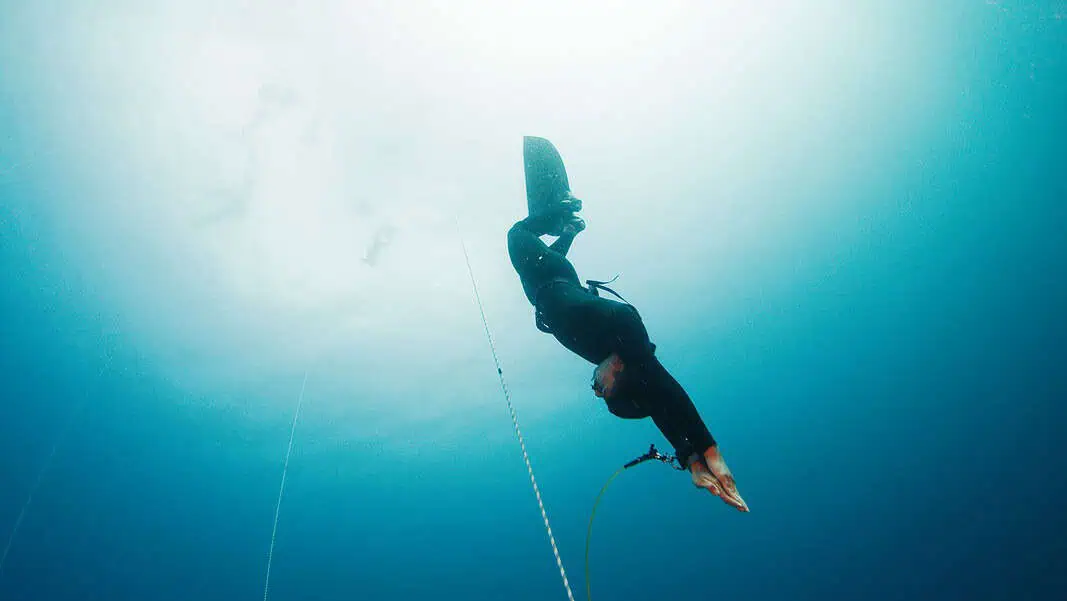Freediving locations are becoming more abundant as the sport’s popularity grows. On the other hand, the deeper you start to dive (50m / 164ft and more), the fewer spots you have to choose from.
There’s a good reason for this: deeper dives come with more serious considerations. Calmer waters with fewer waves and currents make safety considerations like access to emergency and deco O2 and distance from hospitals and hyperbaric chambers non-negotiable.
Are you training for a competition? Then you might also want the option of a competition-style setup, plus a counter ballast, sonar, and dedicated safety divers if you’re diving much deeper.
So, before we discuss the top deep-freeding training destinations of 2025, let’s discuss something a little more serious: safety.
Dive with a School
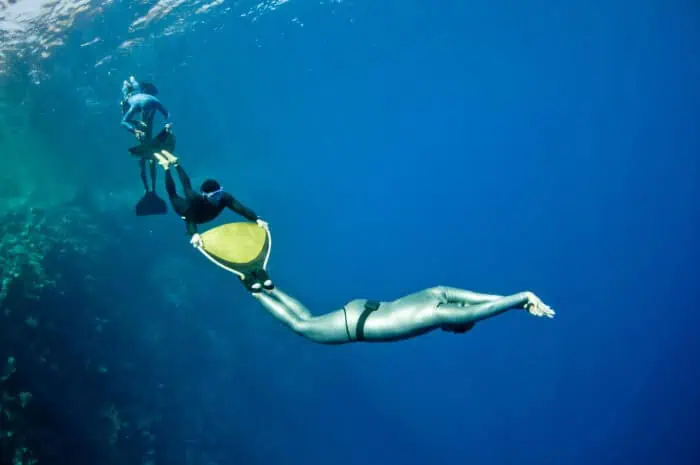
While you can pack up a buoy and line, get to your training destination, buy/make your own bottom-weight, and go diving with a friend or someone you met on social media… should you?
That depends on how seriously you take your own safety. The deeper you dive, the more risks you face… but even if your dives aren’t crazy “deep,” accidents can still happen.
Ask yourself some important questions: How far will your buddies have to tow you back to shore if you suffer a severe blackout or squeeze? Will emergency oxygen be within reach? What about a hospital—do you know where it is and how to get there? Is the nearest hyperbaric chamber operational?
On the other hand, a freediving school that’s well-equipped for training will be prepared for emergencies with necessary supplies and a clear emergency action plan.
The bottom line: It’s your choice whether or not to dive with a school. But if my budget-conscious little sister came to me and asked me that question, I know I’d tell her that saving money should never come at the expense of safety.
Do Your Research Beforehand
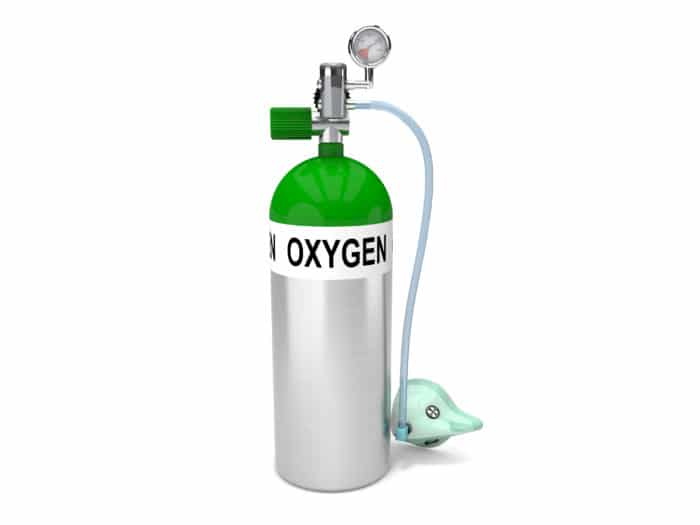
Continuing on the discussion of safety, there are some important questions you should ask the school you’re diving with beforehand.
Namely:
- Do you dive off of a buoy, boat, or platform?
- Is there a counter ballast system?
- Do you have sonar available?
- Is there emergency and deco O2 available?
- Are there safety divers available if needed? Are they qualified?
- What is your emergency action plan if an accident occurs?
The last question is especially important since some countries’ ambulance services aren’t very dependable. Ensure that the school has a plan to get you to the nearest hospital should trouble arise.
Now that that’s covered, let’s get to it!
Where are the top spots around the globe to train deep freediving?
Asia
Panglao, Bohol, Philippines
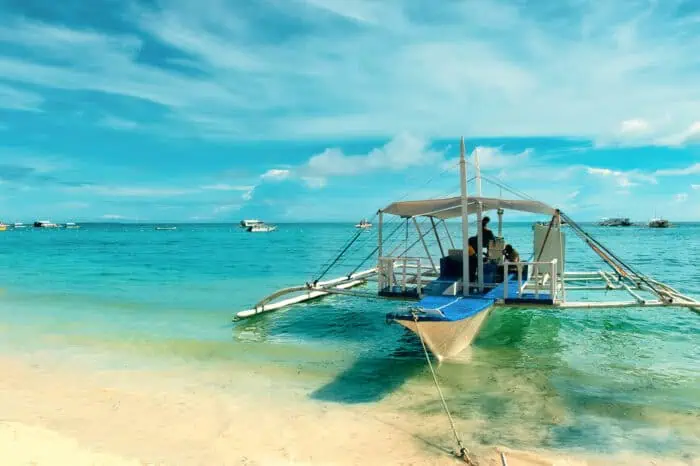
NOTE: Thanks to Freedive SuperHOME for providing info on diving in Panglao.
Best months to train
Decent conditions year-round, however, May-July are ideal, and April and August-September continue to have good conditions when there’s no low-pressure area passing
Conditions
Depth: Up to 200m (656ft)
Sea temperature: 26-31°C (79-88°F)
Water conditions:
- Generally calm surface in ideal months
- Little-to-no current
- Thermocline drops 1°C at 50m (164ft) and 26°C (79°F) or more at 100m (328ft)
Visibility: Up to 40m (131ft)
Access: Swim from shore for shallower depths, by boat for deeper depths
Medical Facilities
Nearest hospital: ACE Medical Center – Bohol
Nearest hyperbaric chamber: Tourism Infrastructure and Enterprise Zone Authority (Panglao Primary Health Care Center is closer, but their chamber is not currently operational as of February 2025)
Other activities
Napaling Reef is famous for freediving or scuba diving through balls of sardines and spotting sea turtles among large sea fans and coral formations. You can also visit the nearby Chocolate Hills and Hinagdanan Cave by car or motorbike.
Cost of living
Low-Moderate
Expect to pay €4-8 for a budget meal, with mid-range accommodations starting at €30 per night and €350 per month (prices according to 2024 and vary by season).
Camotes Island, Cebu, Philippines
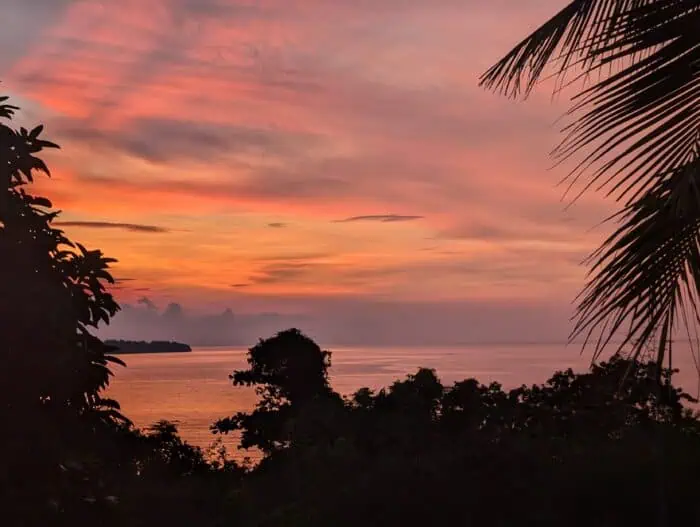
NOTE: Thanks to Camotes Freediving for providing info on diving in Camotes.
Best months to train
April-November
Conditions
Depth: Up to 150m (492ft)
Sea temperature: 29-30°C (84-86°F)
Water conditions:
- Very minimal waves, if any
- No current 90-95% of the time
- Slow and gradual temperature decrease to 23-24°C (73-75°F) at 100m (328ft)
Visibility: Up to 30m (98ft)
Access: By boat
Medical Facilities
Nearest hospital: Ricardo Maningo Memorial Hospital
Nearest hyperbaric chamber: Cebu Doctors University Hospital (located 65km away in Mandaue, Cebu, about 1.5 hours by boat)
Other activities
During your off-hours, enjoy Santiago White Beach or Mangodlong Beach or take a day trip to Tuang Diot Island. Explore Bukilat Cave, Timubo Cave, and Busay Falls for more adventurous outings.
Cost of living
Low-Moderate
Expect to pay €5-6 for a budget meal, with mid-range accommodations starting at €20 per night and €300 per month (prices according to 2024 and vary by season).
Cebu, Philippines
NOTE: Thanks to DOUBLE K International Dive Academy Cebu for providing info on diving in Cebu.
Best months to train
Year-round
Conditions
Depth: Up to 170m (558ft)
Sea temperature: 26-31°C (79-88°F)
Water conditions:
- Some waves
- No current to 90m (295ft), but for deeper dives, a window must be calculated according to high/low tide to avoid currents
- Slow and gradual temperature decrease to 25°C (77°F) at 100m (328ft)
Visibility: Up to 30m (98ft)
Access: By boat
Medical Facilities
Nearest hospital: Allegiant Regional Care Hospital
Nearest hyperbaric chamber: Cebu Recompression Chamber
Other activities
Cebu has plenty of malls for shopping, and historic sites like the Basilica del Santo Niño and Fort San Pedro are nearby. Head to Moalboal to dive with the famous sardine run and go canyoneering at Kawasan Falls.
Cost of living
Low-Moderate
Expect to pay €4-8 for a budget meal, with mid-range accommodations starting at €30 per night and €300 per month (prices according to 2024 and vary by season).
Europe
Larnaca, Cyprus
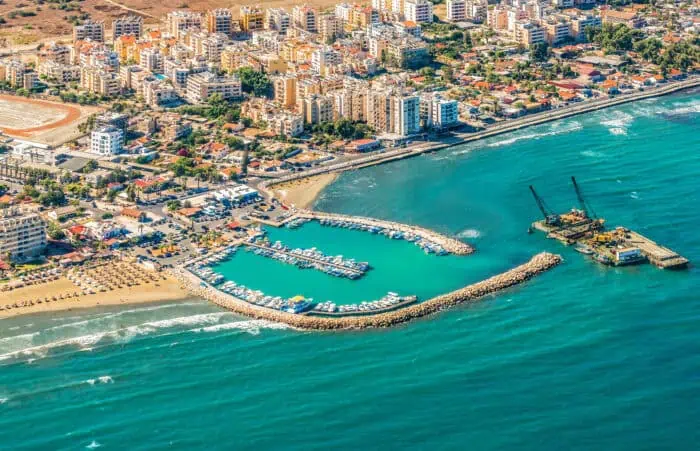
NOTE: Thanks to Freedom Diving Center for providing info on diving in Kalamata.
The best time to train
May-December
Conditions
Depth: Unlimited
Sea temperature: 25-26°C (77-79°F)
Water conditions:
- No strong current or big waves
- A thermocline at 30-40m / 98-131ft (except in July-September, where it’s at 15-20m / 49-66ft)
Visibility: Up to 40m (131ft)
Access: By boat
Medical Facilities
Nearest hospital: Larnaca General Hospital
Nearest hyperbaric chamber: Panacea Medical Center
Other activities
Freedivers can have fun diving at Zenobia Wreck, one of the largest shipwrecks in the Mediterranean, or the famous Museum of Underwater Sculpture Ayia Napa. With a car, historic sites like the Larnaka Medieval Castle, Agios Lazaros, and a few specialty museums are within reach.
Cost of living
Moderate-High
Expect to pay €15-20 for a budget meal, with mid-range accommodations starting at €60 per night and €700 per month (prices according to 2024 and vary by season).
Kalamata, Greece
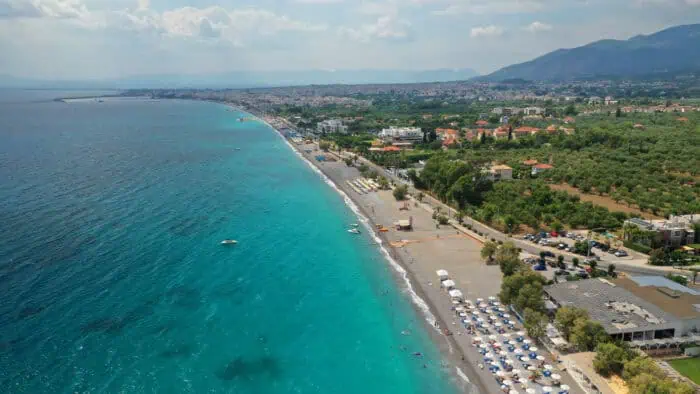
NOTE: Thanks to Kalamata Freedivers for providing info on diving in Kalamata.
The best time to train
April-December
Conditions
Depth: Up to 150m (492ft)
Sea temperature: 19-28°C (66-82°F)
Water conditions:
- Rarely wind or waves
- June sees a 22°C (72°F) thermocline at around 40m (131ft)—otherwise, the temperature gradually drops to 17°C (63°F) at 100m (328ft)
Visibility: Up to 35m (115ft)
Access: By boat
Medical Facilities
Nearest hospital: Kalamata General Hospital
Nearest hyperbaric chamber: Athens Naval Hospital (located 252km away, about a 3-hour drive)
Other activities
Visit Kalamata beach to enjoy famous Kalamata olives and fresh seafood at a seaside taverna. You can also explore the historic Old Town and Kalamata Castle for stunning views. With a car, the ancient ruins of Messene are in reach, one of Greece’s best-preserved archaeological sites.
Cost of living
Moderate-High
Expect to pay €10-15 for a budget meal, with mid-range accommodations starting at €30 per night and €700 per month (prices according to 2024 and vary by season).
Kas, Turkey
NOTE: Thanks to Life Aquatic Freediving and Yoga School for providing info on diving in Kas.
The best time to train
May-November, but the best deep diving conditions are from July-October
Conditions
Depth: Up to 130m (427ft)
Sea temperature: 20-30°C (68-86°F)
Water conditions:
- Negligible currents
- Minimum wave activity
- A thermocline of around 20°C (68°F) at 30m (98ft)
Visibility: Up to 30m (98ft)
Access: Swim from shore for shallower depths, by boat for deeper depths
Medical Facilities
Nearest hospital: Kas Government Hospital
Nearest hyperbaric chamber: Antalya Training and Research Hospital (located about 190km from Kas, a 3-hour drive)
Other activities
While you can paraglide, hike, and scuba dive in Kas, you can also take a break at Kaputas and Limanagzi Beach. Historical sites like the Lycian rock tombs and the ruins of Antiphellos are also a must-see, as well as tours of the Sunken City of Kekova.
Cost of living
Moderate
Expect to pay €5-15 for a budget meal, with mid-range accommodations starting at €30 per night and €500 per month (prices according to 2024 and vary by season).
Caribbean
Soufrière, Dominica
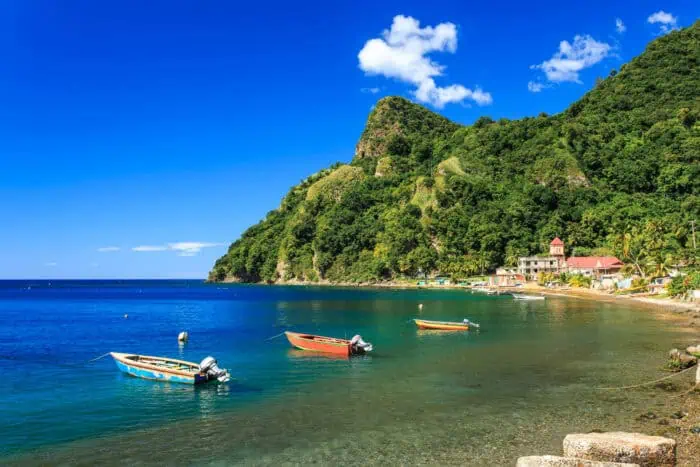
NOTE: Thanks to Deep Dominica Freediving for providing info on diving in Soufrière.
Best months to train
Year-round
Conditions
Depth: Up to 150m (492ft)
Sea temperature: 26-30°C (79-86°F)
Water conditions:
- Rare to get current or waves
- A slow and gradual temperature decrease to 26-27°C (79-81°F) at 100m (328ft)
Visibility: Up to 40m (131ft)
Access: Swim from shore
Medical Facilities
Nearest hospital: Princess Margaret Hospital in Roseau
Nearest hyperbaric chamber: University Hospital of Martinique (located 160km away, approximately 30 minutes by helicopter)
Other activities
Dominica offers plenty of outdoor activities, like hiking on the National Trail, exploring its 365 rivers and various waterfalls, enjoying Freshwater Lake and Boiling Lake, and visiting the hot springs in Soufrière. You can also catch some waves on the northeast coast with a car.
Cost of living
Moderate
Expect to pay €8-15 for a budget meal, with mid-range accommodations starting at €60 per night and €500 per month (prices according to 2024 and vary by season).
Middle East
Dahab, Egypt
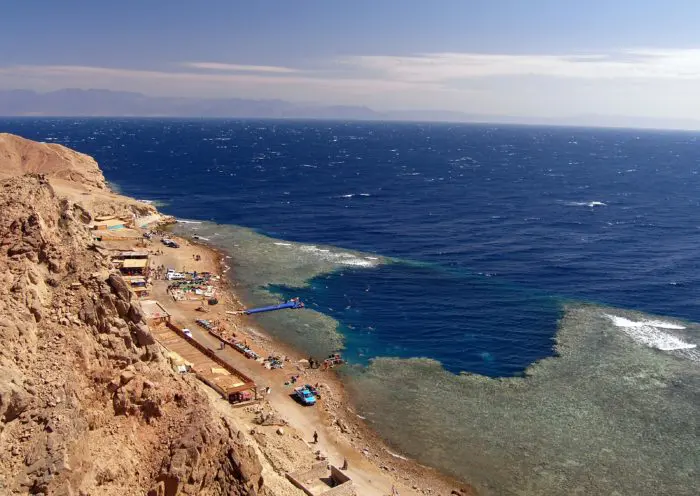
NOTE: Thanks to Dahab Freedivers for providing info on diving in Dahab.
IMPORTANT NOTE: It’s not common practice to dive with a counter ballast in Dahab outside of a competition.
Best months to train
March-November/December
Conditions
Depth: Up to 50m (164ft) in Lighthouse Bay and up to 93m (305ft) in the Blue Hole
Sea temperature: 22-29°C (72-84°F)
Water conditions:
- Some small waves in Lighthouse Bay
- No current, waves, or thermocline in the Blue Hole
Visibility: Up to 40m (131ft)
Access: Swim from shore
Medical Facilities
Nearest hospital: Public Hospital Dahab and Dahab Medical Care Hospital
Nearest hyperbaric chamber: Sharm El Sheikh Hyperbaric Medical Center (located about 100km away, a 1.5 hour drive)
Other activities
While Dahab is famous for its slow lifestyle enjoying the day in seaside cafes and restaurants, it’s also well-known for rock climbing, hiking, and other water activities like windsurfing, kitesurfing, and scuba diving.
Cost of living
Low
Expect to pay €2-10 for a budget meal, with mid-range accommodations starting at €30 per night and €300 per month (prices according to 2024 and vary by season).
Central America
Roatán, Bay Islands, Honduras
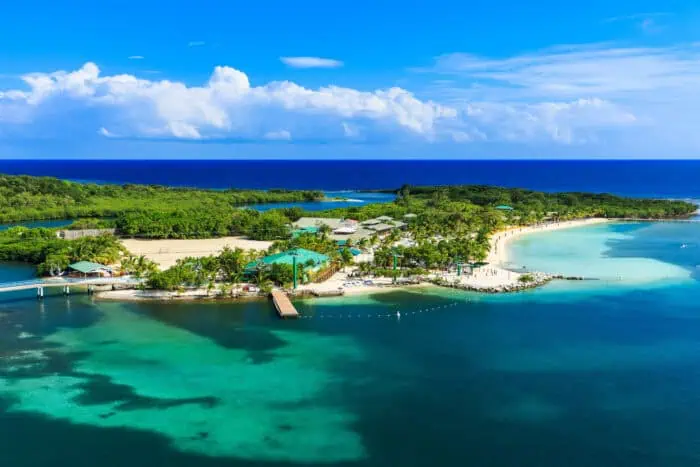
NOTE: Thanks to Roatán Freediving School & Training Center for providing info on diving in Roatán.
Best months to train
February-September
Conditions
Depth: Up to 189m (620ft)
Sea temperature: 25-30°C (77-86°F)
Other conditions:
- Null-to-moderate waves and current
- Slow and gradual temperature decrease, reaching 2°C colder than the surface at 100m (328ft)
Visibility: Up to 40m (131ft)
Access: By boat
Medical Facilities
Nearest hospital: Wood Medical Center
Nearest hyperbaric chamber: Anthony’s Key Resort
Other activities
This is a good opportunity to do a fun dive or scuba dive in the second-largest reef system in the world, the Mesoamerican Reef. There are also nature experiences like the Blue Harbor Tropical Arboretum, the Carambola Botanical Gardens, and mangrove tours. You can also go kayaking, zip lining, or take an ATV tour for more adventure.
Cost of living
Moderate
Expect to pay €5-10 for a budget meal, with mid-range accommodations starting at €60 per night and €600 per month (prices according to 2024 and vary by season).
Laguna de Apoyo, Nicaragua
NOTE: Thanks to Freediving Nicaragua for providing info.
Best months to train
May-November
Conditions
Depth: Up to 165m (541ft)
Lake temperature: 28°C (82°F)
Water conditions:
- Fresh water diving
- Very minimal waves if any
- No current
- No thermocline
Visibility: Up to 20m (66ft)
Access: Swim from shore for shallower depths, by boat for deeper depths
Medical Facilities
Nearest hospital: Hospital Vivian Pellas (located about 30km away)
Nearest hyperbaric chamber: Multiple chambers in San José, Costa Rica (located over 400km away, about an 8-hour drive)
Other activities
Apart from kayaking and paddleboarding, the lake, Nicaragua, is home to top surfing spots for all levels and just a few hours away. To stay closer to home, you can go bird watching, hike crater trails, and spot howler monkeys in the wild.
Cost of living
Moderate
Expect to pay €4-5 for a budget meal, with mid-range accommodations starting at €30 per night and €500 per month (prices according to 2024 and vary by season).
South America
San Andrés, Colombia
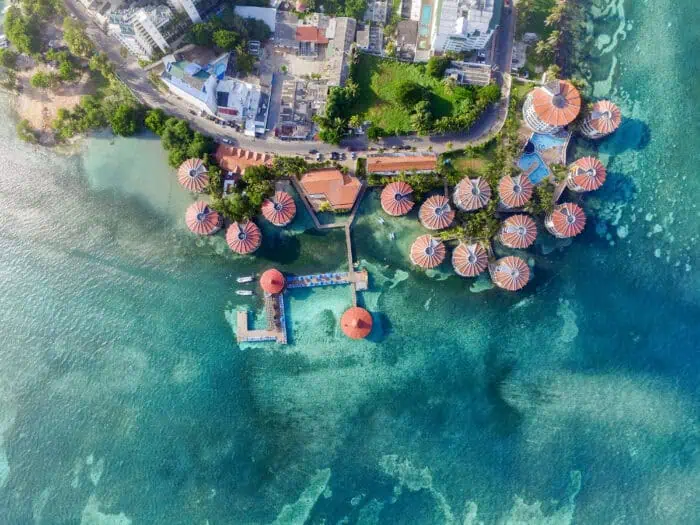
NOTE: Thanks to Freedive Colombia for providing info on diving in San Andrés.
IMPORTANT NOTE: As of February 2025, diving with a counterballast is not yet available in San Andrés, although I was informed that a platform with one is currently being built; check before you go if you require one.
Best months to train
Year-round, but July-November is less so due to hurricane season in the Caribbean
Conditions
Depth: Up to 150m (492ft)
Sea temperature: 27-28°C (81-82°F)
Water condition:
- Not many waves
- Current depends on the day
- No thermocline
Visibility: Up to 40m (131ft)
Access: Swim from shore
Medical Facilities
Nearest hospital: Clarence Lynd Newball Memorial
Nearest hyperbaric chamber: Clarence Lynd Newball Memorial
Other activities
Water sports like parasailing, kayaking through mangroves, and scuba diving are common in San Andrés. Morgan’s Cave and El Hoyo Soplador are also popular attractions among tourists, while beaches like Playa de San Luis and Playa de Spratt Bight can give your wallet a break.
Cost of living
Moderate
Expect to pay €7-12 for a budget meal, with mid-range accommodations starting at €15-25 per night and €400 per month (prices according to 2024 and vary by season).
Locations at a Glance
The table below provides a quick overview of the above deep diving locations, the best time to train, water temperature, and cost of living.
| Location | Best Time | Water Temp | Cost of Living |
|---|---|---|---|
| Panglao | Year-round | 26-31°C | Low-Moderate |
| Camotes | Apr-Nov | 29-30°C | Low-Moderate |
| Cebu | Year-round | 26-31°C | Low-Moderate |
| Larnaca | May-Dec | 25-26°C | Moderate-High |
| Kalamata | Apr-Dec | 19-28°C | Moderate-High |
| Kas | May-Nov | 20-30°C | Moderate |
| Dominica | Year-round | 26-30°C | Moderate |
| Dahab | Mar-Dec | 22-29°C | Low |
| Roatán | Feb-Sep | 25-30°C | Moderate |
| Nicaragua | May-Nov | 28°C | Moderate |
| San Andrés | Dec-Jun | 27-28°C | Moderate |
Whether hunting for warm tropical waters, European coastlines, or budget-friendly countries, the locations above have got you covered!
Remember that the most important factor in deep diving is your safety—dive with a school with an established reputation, ask all the questions you need about how they handle safety, verify their emergency action plan, and confirm what emergency services are available and where.
With proper planning and the right location choice, the sky (or rather the lanyard stopper) is the limit!

